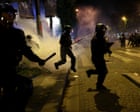A musical tradition has more weight than ever as Estonia looks hard at its neighbour Russia following its invasion of Ukraine
Aarne Saluveer recalls the time his cult Estonian rock band, Karavan, was invited to perform in Moscow in the 1980s, on condition they sang in Russian. “We were on a roll, performing 250 concerts a year. We refused the Soviet authorities’ request. Estonian and English only, we said, knowing that if we relented we’d lose our sense of self because if the music doesn’t come from your heart, you die.”
Four decades on he is no less steadfast, but has swapped his keyboard and vocals to conduct more than 23,000 young choristers at Estonia’s Laulupida youth song and dance festival in the capital Tallinn. The event, where Estonian choirs gather to sing the country’s folk songs, is a key expression of the Baltic state’s identity, and in the late 1980s played a vital part in bringing down communism when crowds took part in the country’s “singing revolution”.








More Stories
Erin Patterson trial live: lead detective in Australian mushroom case continues giving evidence on day 24 of trial
Queensland woman charged over daughter’s murder dies in hospital
UK swings behind Morocco’s autonomy proposal for Western Sahara